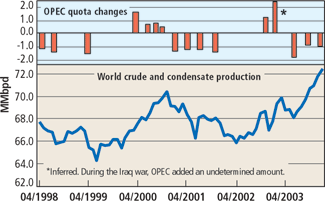Editorial Comment
OPEC rules? I often hear on television, radio, at lunches, speeches, as well as read in the newspaper, the litany of reasons for oil prices being what they are. It's because the US is topping off its Strategic Petroleum Reserve; or it's due to investor psychology over fears of civil war in Iraq; or that Saddam will set fire to his wells; or because Hubbert was right after all; or Chinese demand; or high prices will hurt economies, lessen demand and lead to lower prices; or Venezuelan President Ugo Chavez dropped the "H" from his name. I could go on for some time. It's astounding how often OPEC is mentioned only in passing, or not at all. The simple, unexciting truth is: OPEC controls oil prices. What makes this possible, of course, is the extraordinarily unequal distribution of oil. OPEC produces about 40% of the world's oil and has roughly 70% of its reserves. I'm reminded of that old joke, first made popular by the late Milton Berle on his own TV show, when he said: "After wandering around the desert for 40 years, Moses looked up and asked, 'OK, God, let me see if I've got this right: The Arabs, they get all the oil. And we get to cut off the end of our WHAT?' " And what brings this to the forefront is a proposal by US Senators Mike DeWine (R – Ohio, Chairman of the Senate Antitrust Subcommittee), Herbert Kohl (D – Wisconsin), Arlen Specter (R – Pennsylvania) and several others that OPEC be declared illegal by international standards, sued and otherwise outlawed. This so-called "NOPEC" bill has been introduced twice before, in 2000 and 2001. The bill was approved by the Senate Judiciary Committee in 2000, but was never voted on. It is based on the painfully obvious fact that what OPEC does would normally be considered illegal in most capitalist countries. Along the way, as the senators discuss the legality of OPEC, there will arise several associated, important questions, such as:
Let's deal with the first four questions directly. The last two are questions that should never be asked, at least not in an oilfield trade journal. First, a cartel, by its very nature, can only be fair to its members, because it must compete with overt rivals and clandestine supporters who will – at every opportunity – seek to steal market share from it. Even the quasi-OPEC nations such as Mexico, Norway and Russia, who often agree to some sort of export or production restriction, will turn on a dime and try to steal market share if it serves their interests. Nations have interests much more than they have friends. Part of OPEC's effectiveness is bound up in its ability to pull off a lie. The enemy of all cartels is the considerable power of market forces, and these forces sometimes lead to cheating – otherwise known as competition – and defection within the cartel's ranks. It is desirable for OPEC to hide this non-cooperation as much as possible, so that it might continue to influence oil markets.
In the graph above, I extracted production-quota changes from official OPEC literature and compared them to world production. The net quota change for the period is an incredulous decrease of 5.8 million barrels a day. This is underlain by world crude production, which increased by 4.7 million barrels a day over the same timeframe. Even if all the cuts did not materialize – which is the reality – it's unlikely that OPEC can continue sacrificing market share at this rate. So it would seem that rhetoric must play an increasingly important role in OPEC's mission. The idea of investing in production capacity just to shut it in is contrary to good business practices, the best use of capital and maximization of net present value. But if anyone doubts that OPEC has extra capacity, consider what happened just a year ago. Iraq went off line, Venezuela was far from up to capacity, and an uprising in Nigeria shut in about 700,000 barrels a day of that country's production. And what was the result? Saudi and a few of its friends just turned it to the left, opening the valves enough to flow an additional three million barrels a day or so onto world markets. Oh yes, about those last two unquestionables. It would seem obvious that OPEC, which supports stable prices – albeit at a higher-than-otherwise level – is beneficial to all oil sellers, even those based in oil-importing countries, and even if it's to the economic detriment of those countries. However, if you live in an oil-importing nation, work for a domestic-based oil company, and you are given to a high degree of patriotism, or worse, if a family member was killed on 9/11 and you're part of the lawsuit against Saudi Arabia, then it would seem gut-wrenchingly obvious that you might harbor mixed feelings about OPEC, especially Saudi. Thus, it seems understandable that the senators would use the specter of 9/11, high oil prices and the gloomy situation in Iraq to try to drum up support for anti-OPEC legislation. That is why, senators, you have my undying support and, when you lose mightily, my sympathies. Not to compare their importance, but, in a way, just as the world lives in the shadow of 9/11, this industry lives in the shadow of 1998-'99, when the price of an OPEC barrel collapsed to less than $10, and tens of thousands of oilfield workers lost their jobs. It would appear that free-market based, laissez-faire capitalism doesn't stand a chance in this industry.
|
|||||||||





